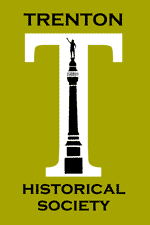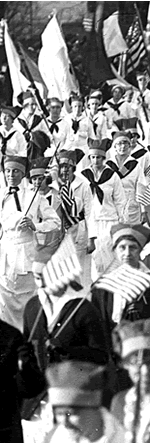



TRENTON
IN BYGONE DAYS
By
John J. Cleary
Sunday Times-Advertiser, April
10, 1932
There
are interesting particulars about the career of Frank H. Smith, the veteran
newsdealer, which do not come to light in ordinary conversation. Mr. Smith is not given to talking about himself.
I learned from him the other day after some cross-questioning, however,
that his memory of the local newspapers goes clear back to the time when
the old True American was published at the southwest corner of Warren and
Front Streets, and that means slightly over sixty years ago.
William H. Smith, his father, had a monopoly of the True American
and State Gazette delivery north of the Assunpink, while the late George
Fitzgeorge, with the aid of a corps of newsboys, served the South Trenton
district. The papers were only four-page sheets at the time and, of course,
the circulation was small, compared with the delivery of today. Where a boy could handily carry his bundle
under his arm in those days, he pretty nearly needs a wheelbarrow nowadays.
An
odd circumstance, in the light of present conditions, is that the few residents
of Greenwood Avenue west of Clinton had to file a protest with the local
publishers because they had no morning service. None of the young carriers wanted a route “so far out in the country,”
but Frank Smith, although only about ten years of age, volunteered and thereafter
Judge Van Syckel and his neighbors of Greenwood Avenue had the Gazette or
True American on the breakfast table daily.
--------------------
Another
of the incidents of newspaper carrying in those times was that, there being
no folder attachment on the flat-bed presses, the newsboys had to fold every
paper by hand before starting on their routes.
Frank Smith made a reputation as the fastest folder in town. Besides his work on the daily, he was one of
several boys employed to fold the “weekly” each Thursday. Both the American and Gazette circulated their
weekly edition by mail throughout the State. The boys received eight cents a hundred for folding the weekly,
which consisted of eight pages, and at this rate earned a good day’s pay. Thursday made a long day for Frank, since his
duties on the daily called him out at 4 o’clock in the morning and it was
after several hours on the road that he began folding the weeklies.
Frank’s
father, like the elder Fitzgeorge, accumulated a good deal of money from
their monopoly of the morning newspaper delivery over a long course of years. Smith, Sr., invested his savings in the building
up of Cooper and Lamberton Streets. Frank
Smith is still active in his duties as a newspaper dealer and dsepite one
or two bumps from automobiles which sent him to the hospital, he travels
about with the agility and alertness of many a man his junior.
--------------------
Bane
L. Temple, engineer at the city pumping station, had his memory stirred
by the announcement of the death of Dr. Fred Woodward about ten days ago
in Arkansas. Only our older citizens
will remember the close association of the two youths in the days when roller
skating was all the rage in Trenton. That
will take us back to the eighties and nineties with pleasant recollections
of the Capitol Rink on Stockton Street just before Academy. So great was the popularity of the sport that
a firm from out of town put up a building specially for the new form of
recreation, and crowds flocked there every afternoon and night while the
craze lasted. Skating space, 140
feet by 48, afforded abundant room, and when gas-light flooded the place
each evening, Peterman’s orchestra discoursed lively music, and the young
men and women of town indulged in their clever maneuvers on the floor with
a large crowd of spectators seated outside the lines, the spectacle was
a gay one indeed, in what was then a rather sleepy old town. There were prize contests by skaters of national reputation and as
a result a number of local boys and girls developed the art sufficiently
to give exhibitions also.
It
was about this time that Temple and Woodward became noted in a double skating
act which always brought them rounds of applause. Temple was only a schoolboy, but Woodward was already in active
practice as a dentist. Fred, however,
was of a somewhat restless disposition, and soon afterwards traveled through
various parts of the country, to the regret of numerous Trenton friends,
who found him one of the most talented and agreeable of our younger citizenship.
He had been in Arkansas since 1916, and was several times elected
as Mayor of Batesville in that State.
Temple,
on the contrary, found Trenton to his liking and has prospered here through
the years.
What
of the old rink? It had several
successful seasons and eventually was operated by Al Winkler and Charles
Furman, the livery man. In course
of time it was razed to make way for dwellings.
--------------------
In
one of those trolley-car conversations in which the venerable Federal Court
Clerk George T. Cranmer and I have an opportunity to indulge from time to
time, mention was made of the recent Trenton Bankers’ dinner. The fact that Harold E. Cranmer was the toastmaster
led Senator Cranmer to claim Harold as one of the Ocean county family of
that name. His father, it appears,
had charge of the Barnegat lighthouse for some years.
“The
Cranmers seem to have quite a footing in that neck of the woods,” I commented.
“I’ll
tell you a story that will make you think so,” said the Senator, and this
was the story:
Away
back in the early 80’s, George Cranmer was running for Assembly in his home
county of Ocean and the late J. Hart Brewer, of Trenton, was running for
Congress. One day Cranmer undertook
to do a little campaigning with Brewer, and the first man they called upon
was introduced to the Trentonian as “My friend, Mr. Cranmer.” Brewer, who possessed all the qualities of
a good campaigner, extended his hand and there was a cordial greeting.
A
little farther down the road they met another citizen.
“Permit
me to introduce my friend, Mr. Cranmer!” said the future Senator.
Again
there was a smile and a handshake with Brewer, who, however, looked as if
he had something on his mind.
The
campaigners proceeded on their way after the usual interval of pleasant
words and after a while another voter was encountered.
“Allow
me to present a dear old friend of mine, Mr. Cranmer!” said George.
But
this wasa too much for Brewer who was a good deal of a wag. “Say, George,” he remarked with a somewhat
incredulous, “if you get the solid Cranmer vote, Ocean County ought to be
good for a thousand Republican majority!”
“Well,”
said the Senator concluding his story, “I got a big majority for the House
of Assembly anyway, and Brewer carried the district handsomely, too.”
--------------------
“Do
you remember that fine grandstand on the Perrine baseball field years ago?”
asked William Korn, the tall, well-built man you are apt to see keeping
a close eye on all comers and goers – and in particular on mischievous-looking
boys – in the Post Office corridors.
I
remember it very well, as do thousands of other Trentonians who used to
patronize the Trenton Baseball Club in the days of the Tri-State League
with Wilmington, Lancaster, Harrisburg and other cities as formidable competitors
with this city. The grounds were
located on West State Street, just beyond the site of Junior High School
No. 3. It was probably the best
setup ever provided for a local field and the late Colonel Lewis Perrine
was responsible for the good taste shown.
But
what William Korn, who was grounds manager, had in mind relates to the fate
of the grandstand after the West State Street grounds were abandoned. I couldn’t throw any light on that question.
“It
was sold to Elmira, New York,” said Korn, “and is doing service there yet.”
That
will probably be news to a good many Trentonians and any of us who journey
through Elmira this summer are pretty sure to look for the old grandstand
that once sheltered local baseball fans.
--------------------
Talking
of old-time amusements, the quotations from the files of the State Gazette,
printed last week, mentioned a theatrical performance given in the Atheneum
in 1857.
There
must be a great number of people who cannot tell where the Atheneum was
located. Just to freshen up local
traditions a bit, I may state that this first of Trenton playhouses (if
we except the old City Hall salon) stood where the Ribsam stores are noe
located, on East Front Street. Later
it was Bechtel Hall.
Up To Top /
Home
The Society : About Us / Artifacts
Committee / Education Committee / Preservation
Committee / Membership / Contact
Us / Events
Our History : Sights & Sounds
/ 1929 History / Old
& New / Hill Diaries / Chronological
Indexes / Trenton Made / Documents / Tours
Your Ancestors : Research Services
/ Obituaries / City
Directories / High School Yearbooks /
Cemeteries / Genealogy
The City : Buildings /
Historic Districts / North
Ward Survey / Street Names / Local
Links
Search Our Site
Up
To Top / Home
The Society : Preservation
Committee / Artifacts Committee / Membership / Contact
Us / Events
Our History : Sights & Sounds / 1929
History / Old & New / Hill Diaries/ Chronological
Indexes / Trenton Made
Your Ancestors : Research Services / Obituaries / City
Directories / High School Yearbooks / Cemeteries
The City : Historic Districts / North
Ward Survey / Street Names / Local Links